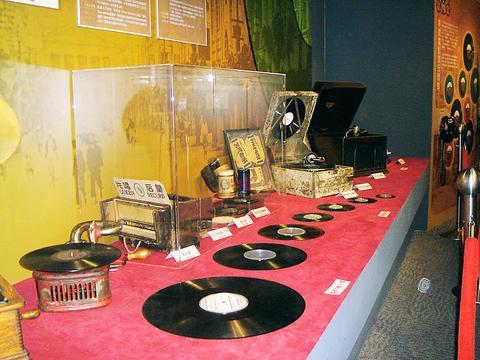Until the early 1980s, Taiwanese songs that criticized the government were blacklisted. A thick, black-ink marker was used to cover up the song title and the producer was fined. Case closed.
Fortunately, one such record entitled Unchanging Love (

PHOTO: CHRIS FUCHS, TAIPEI TIMES
The exhibition, The Song, Taipei and Me, is contained within one room on the second floor of Taipei City Hall. Although rich in explanations about the development of popular music in Taiwan, the exhibit's content is somewhat difficult to grasp, unless of course you either grew up here or are an expert in the subject.
The Song, Taipei and Me is arranged chronologically, first grounding Taiwan's musical history in the folk songs sung by Aborigines, Hakkas and Minnan people. It wasn't until 1932, however, that Taiwan made its mark on the pop music map, when a Taiwanese song was used in a slient movie filmed in Shanghai titled Sobbing Peach Blossoms, said Yang Mei-Jen, a spokeswoman for the center.
Before 1945, during Japanese rule, the content of music was strictly controlled. The use of Chinese characters was forbidden and it was required that Japanese song melodies be used together with Taiwanese lyrics.
In fact, it wasn't until after Japan ceded control of Taiwan in August 1945 and the Chinese Nationalist Party (KMT) moved to Taipei that Mandarin songs first found their way into Taiwan's music market.
From then on, the island's musical industry blossomed. During the 1940s, for instance, Danshui -- the Ximending of that era -- became a mecca for pop music lovers. For the price of a cheap cup of tea, anyone could lounge on a bamboo bench alongside the Danshui river and listen to Taiwanese songs well into the night.
Interestingly enough, Danshui some 30 years later gave rise to a musical movement called "Campus Songs," after one artist, Li Shuang-ze (
Later, these "Campus Songs," whose lyrics stressed sincerity and inner peace, became popular not only among college students but also among the general public.
The chronology ends with the present state of pop-music in Taiwan, detailing how TV and radio helped popularize music during the 1960s and 1970s. It also briefly cites current musical talents like the LA Boyz, a group composed of three US-born Taiwanese brothers, and Tokyo D, a Japanese singer.
Most of the exhibition props consist of records and record players, relics that are standard fare and not very captivating. There are, however, a number of songs you can listen to, which should help put the different music genres into perspective.
There is also a clip of the movie Sobbing Peach Blossoms that can be viewed while listening to the soundtrack.
On the whole, The Song, Taipei and Me succeeds in proving that Taiwan in general, and Taipei more specifically, has a rich musical history.
Exhibition notes:
What: The Song, Taipei and Me (歌我台北)
Where: Discovery Center of Taipei (台北探索管) 1 Shifu Rd, Taipei (臺北市市府路一號)
When: Now until Oct. 10
Hours: Tuesday to Sunday, 9am to 5pm
Tickets: Free admission

June 9 to June 15 A photo of two men riding trendy high-wheel Penny-Farthing bicycles past a Qing Dynasty gate aptly captures the essence of Taipei in 1897 — a newly colonized city on the cusp of great change. The Japanese began making significant modifications to the cityscape in 1899, tearing down Qing-era structures, widening boulevards and installing Western-style infrastructure and buildings. The photographer, Minosuke Imamura, only spent a year in Taiwan as a cartographer for the governor-general’s office, but he left behind a treasure trove of 130 images showing life at the onset of Japanese rule, spanning July 1897 to

In an interview posted online by United Daily News (UDN) on May 26, current Chinese Nationalist Party (KMT) Chairman Eric Chu (朱立倫) was asked about Taichung Mayor Lu Shiow-yen (盧秀燕) replacing him as party chair. Though not yet officially running, by the customs of Taiwan politics, Lu has been signalling she is both running for party chair and to be the party’s 2028 presidential candidate. She told an international media outlet that she was considering a run. She also gave a speech in Keelung on national priorities and foreign affairs. For details, see the May 23 edition of this column,

The Taiwan People’s Party (TPP) on May 18 held a rally in Taichung to mark the anniversary of President William Lai’s (賴清德) inauguration on May 20. The title of the rally could be loosely translated to “May 18 recall fraudulent goods” (518退貨ㄌㄨㄚˋ!). Unlike in English, where the terms are the same, “recall” (退貨) in this context refers to product recalls due to damaged, defective or fraudulent merchandise, not the political recalls (罷免) currently dominating the headlines. I attended the rally to determine if the impression was correct that the TPP under party Chairman Huang Kuo-Chang (黃國昌) had little of a

At Computex 2025, Nvidia CEO Jensen Huang (黃仁勳) urged the government to subsidize AI. “All schools in Taiwan must integrate AI into their curricula,” he declared. A few months earlier, he said, “If I were a student today, I’d immediately start using tools like ChatGPT, Gemini Pro and Grok to learn, write and accelerate my thinking.” Huang sees the AI-bullet train leaving the station. And as one of its drivers, he’s worried about youth not getting on board — bad for their careers, and bad for his workforce. As a semiconductor supply-chain powerhouse and AI hub wannabe, Taiwan is seeing